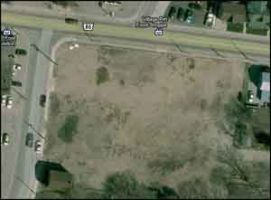|
Waterloo Region Generations
A record of the people of Waterloo Region, Ontario. |
Church St. E. 0019 - brick buildings - demolished 2004 Gone Elmira
1001 - 2004 (100 years)-
Name Church St. E. 0019 - brick buildings - demolished 2004 Gone Elmira Nickname 2 Born 1001 19 Church St. E., Elmira, Ontario 
Gender Unknown Died demolished 2004 Land 2010 19 Church St. E., Elmira, Ontario 

19 Church St., E. Elmira, Ontario
Aerial 2010Person ID I150 Properties Last Modified 6 Dec 2011
-
Photos 19 Church St. E., Elmira School First Brick School in Elmira, Ontario
19 Church St. East, Elmira, Ontario19 Church St. East., Elmira
Back of building, gothic windows of original school showing. Demolished 2004. Taken by Marion Roes
-
Notes - Procast Foundries Inc. - 19 Church Street East
[South east corner of Church Street East and King Street; in 2011 King Street is Memorial Avenue]
As you come to the foundry, look toward the rear portion of the east side. In this incongruous setting you will see some Goth pointed-arch windows, remnants of Elmira's first brick school. The 1862 school building was sold to be used as a foundry after a larger school was built around 1885 on the site of the present Riverside school. It is believed that the log school building which served as the earliest school was also on the foundry site, near the intersection of Church and King Sts. The foundry is also the site of a brick building built in 1855 which served as the Methodist church for twenty years. And at the turn of the century, the present parking lot (west side) was the site of Mr. J. B. Lein's carriage shop. The foundry itself has been an industry important to Elmira's history. It was founded in 1886 by Messrs. P. Jansen of Elmira and Abs. Merner of Waterloo to manufacture and repair agricultural machinery. In 1902 the foundry was purchased by a joint stock company and became known as the Elmira Agricultural Works Company, Limited. Business was good, and extensive additions and improvements were made to the building in the early years of this century. Though the business has changed hands several times since, it remains a foundry. [The building was demolished in 2004.]1a
1aElmira Three Walking Tours, compiled by Susan Bryant and Bertha Thompson for the Township of Woolwich LACAC (Local Architectural Conservation Advisory Committee), December, 1985 - submitted by Marion Roes with permission of the authors 2011
___________________________
In 1977, FMC Corporation of Canada Limited decided to divest itself of certain metal-fabricating divisions, including the Elmira foundry operation. The corporation was reluctant to see the foundry closed down completely, and looked for a buyer to continue the business. On March 1, 1978, Russell McKee - along with his son Philip and his brother Gerald - purchased the Link-Belt Foundry, and have continued to operate it as Procast Foundries Inc. The foundry has been a part of the local industrial community for many years. Prior to 1886, a Methodist church and Sunday school stood at the corner of King and Church streets. In that year, a new church was built, and the old church was used as a lumber sales depot. Mr. P. Jansen of Elmira and Mr. A. Merner of Waterloo started the foundry in the old Sunday school. Subsequent additions have almost surrounded the walls of the old school, but three of the original arched windows are still intact. About 1900, Waterloo Manufacturing Company acquired the business, and manufactured threshing machines for a few years. Then the foundry was purchased by the Laschinger family, and operated as Elmira Agricultural Works. In 1912, a new company called Elmira Machinery and Transmission Company Limited was organized and bought the factory and business for $7,000. Harry Vice was the manager. Link-Belt Limited purchased the company in 1927. FMC Canada Limited acquired the Link-Belt company in 1969 and continued to operate the foundry until it was acquired by the McKees in 1978. Russ McKee, president of the company describes Procast as a jobbing foundry, making medium and heavy-weight castings to order, for over 40 customers. Cast-iron centrifugal pumps, vales, gears, sprockets and flywheels are included in the miscellany of products.
"Although most of our customers are in Ontario, a considerable number are in the United States," Russ McKee said. Procast employs 32 men who work on two shifts. Despite competition from large foundries, this Elmira plant continues to thrive. The workmen have years of experience and a reputation for dependable workmanship.2a
2aExcerpts from the Elmira Independent, "Procast Foundries Inc. Now Run By McKees: Former Link-Belt foundry is Elmira's oldest industry," by Ron Howey, December 5, 1979. Used with permission.
- Procast Foundries Inc. - 19 Church Street East
-
Event Map  = Link to Google Earth
= Link to Google Earth
This site powered by The Next Generation of Genealogy Sitebuilding ©, v. 12.0.1, written by Darrin Lythgoe 2001-2025.